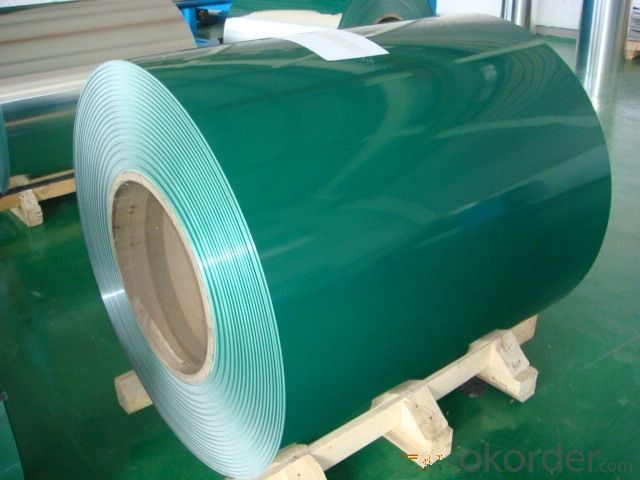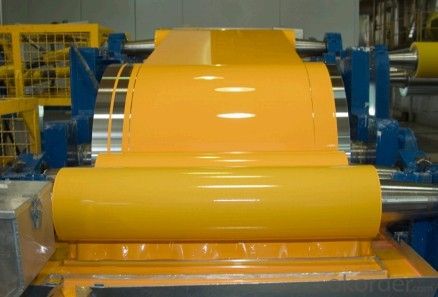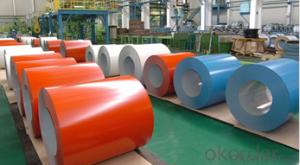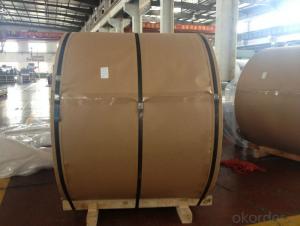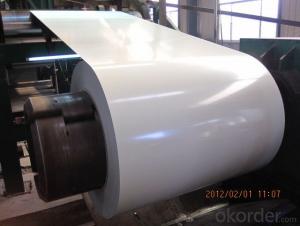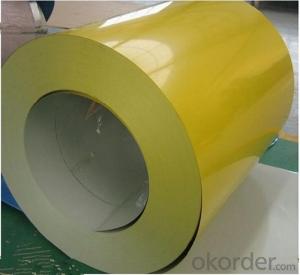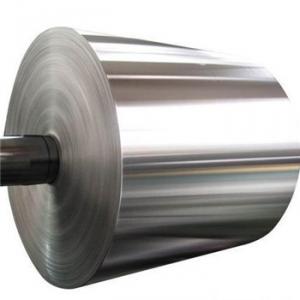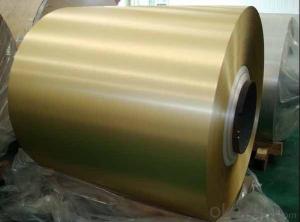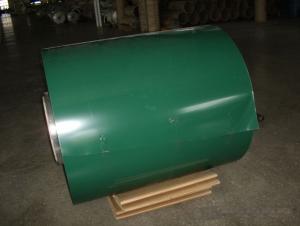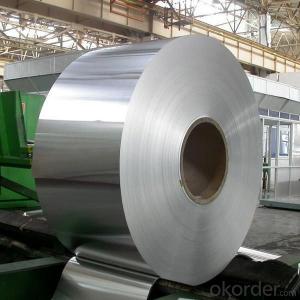Aluminum Copper Coil Coated Aluminum Roll for Nameplate Materials Production
- Loading Port:
- Shanghai
- Payment Terms:
- TT OR LC
- Min Order Qty:
- 2 m.t.
- Supply Capability:
- 60000 m.t./month
OKorder Service Pledge
OKorder Financial Service
You Might Also Like
Specification
Coated Aluminium Roll For Nameplate Materials Production
Alloy | 1050, 1060,1100, 3003 3004 3105 3A21 5005 5052 etc |
Temper | O/H12/H14/H1/H18/H32/H34/H36/H38//H111/H112/H116/H321/T6/T651/T3/T351 etc |
Thickness | 0.1mm to 6mm |
Width | 20mm to 3300mm |
Coil weight | 100kgs to 6 tons depends on actual requirement |
Core material | Aluminum or paper |
Coil inner diameter | 75mm, 150mm, 200mm, 300mm, 405mm, 505mm or as required |
Appplication | construction, roofing, decoration, lamping etc |
Package | eye to wall or eye to the wall for aluminum coil with wood pallet (wooded case also available) |
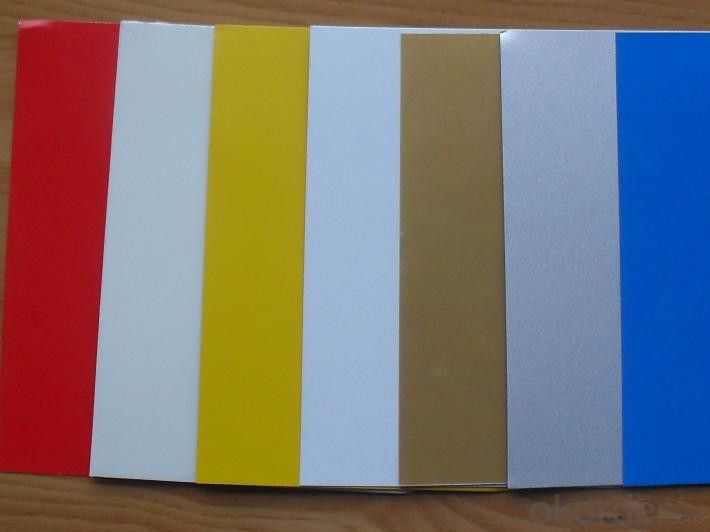
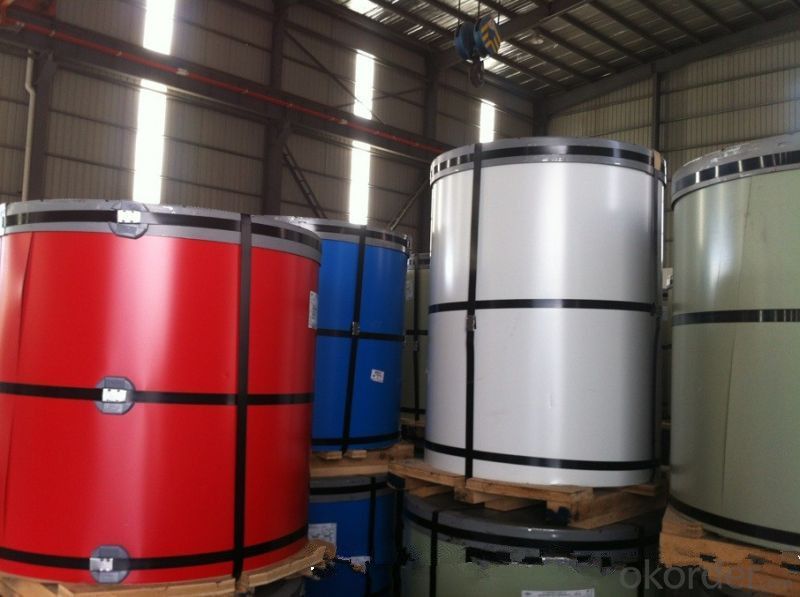
3) Glass curtain wall frame
4) Interior decoration
5) Elevator decoration
6) Signs, nameplate, bags making.
7) Automobile parts material
8) Office and Household appliances: HVAC equipments
9) The consumer electronics: mobile phones, digital cameras, MP3 .etc.
Coating varieties
Polyester Coatings (PE)
PE (polyester) coatings exhibit an excellent combination of hardness, flexibility, flow, appearance, and superior resistance to dirt retention in indoor and outdoor applications. These coatings are highly resistant to abrasion, metal marking, staining, and marring, and require minimal maintenance. Glazetech uses polyester paints which provide excellent colour and gloss retention properties.
Polyvinylidene Fluoride Coatings (PVDF)
PVDF (polyvinylidene fluoride) is a chemical resistant thick film barrier coating commonly used in architectural applications where both excellent appearance and substrate protection must be maintained over a long period of time. This coating is unaffected by most chemicals and solvents and has excellent wear and abrasion resistance. PVDF also has a high dielectric strength, excellent resistance to weathering and the ability to self extinguish.
FAQ
--Q: Do you provide free samples?
--A: Yes, free samples will be sent to you on freight at destination.
--Q: Can I get your latest products catalogue?
--A: Yes, it will be sent to you in no time.
--Q: What is the MOQ?
--A: 2 tons
--Q: What are your payment terms?
--A: We accept L/C, T/T.
--Q: What kinds of alloy can you supply?
--A: 1000 series: 1050, 1060, 1070, 1100, 1145, 1200
3000 series: 3003, 3004, 3105, 3104
5000 series: 5052, 5083, 5754, 5182
6000 series: 6061, 6063, 6062, 6063
8000 series: 8011, 8021
--Q: What’s the coating of top side?
--A: PVDF and PE coating
--Q: What kinds of temper can you supply?
--A: O-H112: O,H12,H14,H16,H18,H22,H24,H26,H,32,H34,H111,H112
T3, T4, T6
- Q: Can aluminum coils be used in packaging industries?
- Yes, aluminum coils can be used in the packaging industry. Aluminum is a popular choice for packaging materials due to its numerous advantageous properties. It is lightweight, durable, corrosion-resistant, and has excellent thermal conductivity. These qualities make aluminum coils suitable for various packaging applications, such as food and beverage packaging, pharmaceutical packaging, and cosmetic packaging. Additionally, aluminum is highly recyclable, making it an environmentally friendly choice for the packaging industry. Overall, aluminum coils offer excellent performance and versatility, making them a suitable option for packaging industries.
- Q: hello, i have been recently studying the production of aluminum from aluminum dross (recycling of aluminum) .this chemical equations represents the hydrolization of sodium aluminate to obtain aluminum hydroxide :Na2Al2O4 + 4H2O -----------gt; 2Al(OH)3 + 2NaOHafter that the next step is to produce Al2O3the next step to obtain Aluminum is to pass a current through the solution (electrolysis)this is the part that i don't get .... how could we electrolyze Aluminium oxide to produce aluminum if we are recycling aluminum ... i mean electrolysis consumes most of the energy and is very expensive .... so how do electrolysis be used in the recycling industry...please answer ... all answers are really appreciated ....and correct me if my informations are wrong...
- OMG Zilla...you're a TC!!! i might somewhat not think of roughly God or the rest seeing via aluminum foil. It makes me experience bare. I positioned on it each and every of the time. undergo thinks that's attractive. :)
- Q: Can aluminum coils be used in the production of aluminum composite walls?
- Yes, aluminum coils can be used in the production of aluminum composite walls. Aluminum composite walls are typically made by sandwiching a layer of polyethylene between two aluminum sheets. The aluminum coils are first processed to form flat aluminum sheets, which are then used as the outer layers of the composite wall. The coils are unrolled and flattened during the manufacturing process to create the desired width and thickness of the aluminum sheets. These aluminum sheets offer excellent strength, durability, and weather resistance, making them ideal for use in aluminum composite walls. Additionally, the use of aluminum coils allows for efficient and cost-effective production, as they can be easily processed and formed into the required dimensions.
- Q: What industries commonly use aluminum coils?
- Several industries commonly use aluminum coils due to the many beneficial properties of aluminum. One of the largest consumers of aluminum coils is the automotive industry, where they are used in the manufacturing of various components such as radiators, condensers, and heat exchangers. The construction industry also extensively utilizes aluminum coils for applications like roofing, gutters, and siding due to their lightweight, corrosion-resistant, and durable nature. Aluminum coils are also widely used in the HVAC (heating, ventilation, and air conditioning) industry for the production of air handling units, heat pumps, and ductwork. The electrical industry utilizes aluminum coils in the production of transformers, as aluminum's high electrical conductivity makes it an excellent choice for these applications. Additionally, the packaging industry often employs aluminum coils for the production of cans, containers, and foils. Aluminum's ability to form a protective oxide layer and its excellent heat conductivity are particularly advantageous in packaging applications. Other industries that commonly use aluminum coils include aerospace, marine, and transportation, where their lightweight nature helps improve fuel efficiency and enhance performance. Overall, the versatility, durability, and excellent physical properties of aluminum make it a preferred choice of material for numerous industries that rely on aluminum coils for various applications.
- Q: This question asks for a comparison between aluminum coils and other metal coils, highlighting their distinct characteristics.
- <p>Aluminum coil is distinct from other metal coils due to its lightweight, high corrosion resistance, and excellent thermal and electrical conductivity. Compared to steel coils, aluminum coils are softer and more ductile, making them easier to bend and shape without breaking. They are also non-magnetic and have a lower melting point. Copper coils, on the other hand, have superior electrical conductivity but are heavier and more expensive. Zinc coils offer good corrosion resistance but are less ductile and have lower strength. Each metal coil has specific properties that make them suitable for different applications, such as construction, electrical wiring, or automotive parts.</p>
- Q: What are the storage life and shelf life of aluminum coils?
- The storage life and shelf life of aluminum coils can vary depending on various factors such as the storage conditions and the specific type of aluminum alloy used. Generally, aluminum coils have a relatively long storage life and shelf life. In terms of storage life, aluminum coils can be stored for an extended period of time without significant degradation in their quality or performance. However, it is important to store them in a dry and well-ventilated area to prevent corrosion. Moisture can cause oxidation and corrosion, which can affect the integrity and durability of the aluminum coils. As for the shelf life, aluminum coils can remain in good condition and retain their functional properties for an extended period of time when stored properly. The exact shelf life will depend on the specific application and the intended use of the aluminum coils. To ensure the longevity of aluminum coils, it is recommended to follow the manufacturer's guidelines for storage and handling. Additionally, regular inspections and maintenance can help identify any signs of corrosion or damage and take appropriate measures to prevent further deterioration.
- Q: i have a project that requires me to know how safeway aluminum foil is made. i researched it on the internet, and also called safeway for it. they never gave me an answer. same for the diamond aluminum foil.please help!!!!i just need to know where they make it, how thick it is, and/or information about the ingots (such as size)and also temp. of heating room
- I'd okorder /... and they have some things on sheet as well. Something that neither covers is the lamination process, wherein the aluminum foil is coated with an organic layer (a really thin layer of plastic) to keep the metallic taste out of the food that it contacts. I believe that different companies have different ways of applying the coatings, but I'd bet they're all some variant of dip, brush, or spray followed by a heat cure. Good luck on your project!
- Q: How do aluminum coils compare to copper coils in terms of performance?
- Aluminum coils generally have lower thermal conductivity compared to copper coils, which can affect their performance in terms of heat transfer efficiency. Copper coils are more efficient at transferring heat, making them more effective in cooling and heating applications. However, aluminum coils are lighter and less expensive, which can make them a suitable choice for certain applications with budget constraints or weight limitations. Ultimately, the choice between aluminum and copper coils depends on the specific requirements and priorities of the system in which they are being used.
- Q: What are the different coil packaging options for aluminum coils?
- The different coil packaging options for aluminum coils include wooden crates, steel frames, cardboard boxes, plastic wrapping, and pallets. These packaging options are chosen based on factors such as the size and weight of the coils, transportation requirements, and protection needed during storage or shipment.
- Q: This is not for around the house. It is for my lab. I am pretty sure these one wires are Aluminum, but I need the connector they were made with and the power cable is copper. Would it be okay to still try to join the two.
- yes but use wire nuts
Send your message to us
Aluminum Copper Coil Coated Aluminum Roll for Nameplate Materials Production
- Loading Port:
- Shanghai
- Payment Terms:
- TT OR LC
- Min Order Qty:
- 2 m.t.
- Supply Capability:
- 60000 m.t./month
OKorder Service Pledge
OKorder Financial Service
Similar products
Hot products
Hot Searches
Related keywords


